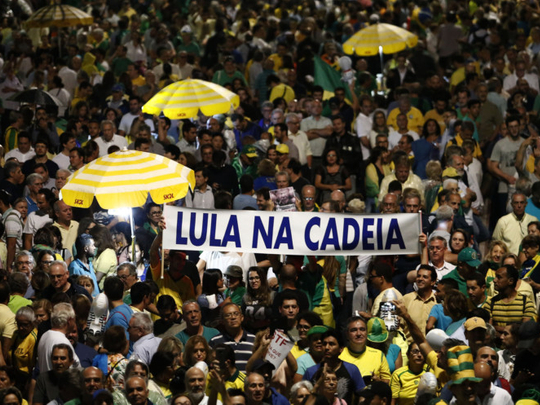
SAO PAULO: Thousands of Brazilians demonstrated in favour of prison for former president and election front-runner Luiz Inacio Lula da Silva on the eve of a Supreme Court ruling Wednesday on whether he should start serving a 12 year sentence for corruption.
Up to 20,000 people turned out after work in the country’s biggest city, Sao Paulo, as well as a few thousand in Rio de Janeiro and smaller numbers in other cities.
The head of the army, General Eduardo Villas Boas, tweeted that the military shared Brazilians’ “desire for the repudiation of impunity.”
The comment, likely to be seen as backing prison for Lula, was a rare foray into politics by a general in a country that was under military dictatorship for two decades until 1985.
Villas Boas also asked “who is really thinking about the good of the country and future generations and who is only worried about personal interests?”
The protesters demanded that Lula begin his sentence and be barred from the October 7 presidential election in which the veteran leftist is leading in the polls, despite his legal problems.
“We want Brazil to be freed of this shameful corruption. Imprison Lula and let Brazil turn the page,” said Mara Massa, 67, at the protest in Sao Paulo, where the crowd chanted “No more Lula!”
Smaller demonstrations in favour of the Workers’ Party founder also took place around the country.
The court showdown scheduled in the capital Brasilia on Wednesday has become a focal point for Brazil’s deeply divided electorate.
Lula, 72, was sentenced to 12 years and one month in prison after being convicted last year of accepting a seaside apartment as a bribe from a huge construction company seeking government contracts. He appealed in a lower court, but lost.
Under current law, that means he should go immediately to prison, while pressing further appeals. However, Lula has asked the Supreme Court to grant him habeas corpus recourse, allowing him to remain free while pursuing those appeals.
The court is believed to be evenly split on the issue, so that one judge changing position would be enough to secure Lula’s freedom — and boost his uphill bid for a third term in office.
If the court turns him down, he could face jail this week.
Those on the left who remember Lula for lifting tens of millions of people out of poverty during his two terms from 2003-2010 consider the threat of prison an attack on democracy.
Lula told a large crowd in Rio de Janeiro late Monday that he saw his fight as continuation of the struggle against a two-decade dictatorship that ended in 1985.
“I did not accept the military dictatorship and I will not accept this dictatorship of the prosecutors,” he said.
Ahead of Villas Boas’s unusual comments, an army reservist general lashed out in Estadao newspaper that a Supreme Court ruling that freed Lula would “induce” violence and “fratricidal conflict.”
General Luiz Gonzaga Schroeder Lessa, who has a history of making provocative remarks, even appeared to threaten a coup, saying an eventual Lula election victory would “leave no recourse but an armed reaction. The armed forces would have to restore order.”
The top court is also under huge pressure from prosecutors like Deltan Dallagnol, who are spearheading Brazil’s mammoth “Car Wash” anti-graft probe, which has netted scores of high-ranking politicians beyond Lula.
On Monday, more than 5,000 judges and prosecutors signed a petition against granting Lula his habeas corpus request. The Supreme Court chief justice, Carmen Lucia, received 10,000 emails from Brazilians on Tuesday alone, local media reported.
Prosecutor General Raquel Dodge said that allowing convicted criminals to stay free pending several appeals would “annihilate” the justice system.
However, one of the 11 Supreme Court justices, Gilmar Mendes, tried to reassure the nation, saying the court’s ruling — whichever way it went — would lead to “a calming down, not an increase in conflict.”
Lula is not the only major Brazilian politician in trouble this week.
Current centre-right President Michel Temer, who already faces two corruption charges, is embroiled in new controversy following the arrests of several close associates on graft charges.
They were charged Thursday in connection with the “Car Wash” probe into whether port logistics company Rodrimar was given contracts at Sao Paulo’s huge Santos port after bribing Temer.
A third charge against Temer could be announced, although as long as he is in office he faces little risk of prosecution.












